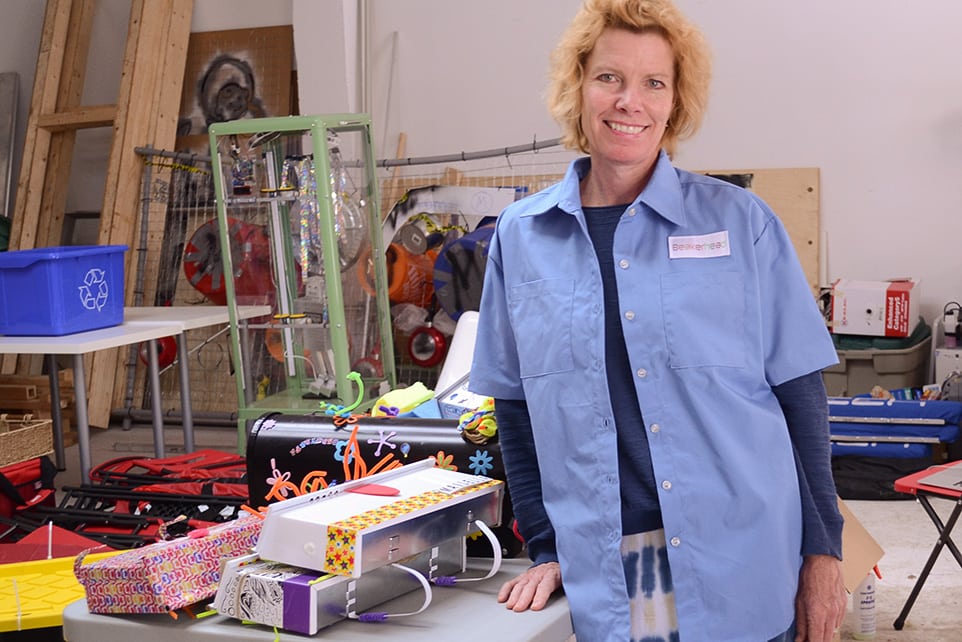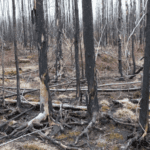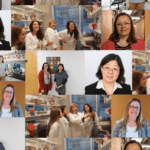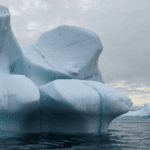Have you heard of Beakerhead, Canada’s smash up of art, science and engineering? If not, you’re missing out. Held every September since 2013 in Calgary, Alberta, Beakerhead bills itself as a gathering of spectacles and quirky adventures, bringing an eclectic combination of art and science workshops, culinary events, and performances to over 130,000 people in 2016 alone.

Image: SAIT Journalism
Mary Anne Moser is the CEO and co-founder of Beakerhead—one of several jobs she’s created for herself since completing an undergraduate degree in zoology at the University of Calgary in 1988.
Moser made the random observation early on in her career that she was interested in things that started with the letter “e”: entomologist, epidemiologist, editor, ethnographer, epistemologist… “I was drawn to the place where science and society intersected,” says Moser. “I loved science and being outside, seeing how the world was put together. But I was also really compelled to understand how human beings operated as a species in this natural environment.”
Much of Moser’s early interest in science came from her best friend. “Her family was very close to nature and she had a fantastic microscope in her bedroom, plus dissecting trays and all sorts of animal bits and bobs: feathers, skin, and found objects,” says Moser. “Her world was one of great wonder and attraction to me.”
After completing her zoology BSc, Moser went to work for the Banff Centre. It was here that she gained the concrete skills that she credits with making her employable in a variety of jobs. “I developed writing, editing, graphic design, and project management skills,” says Moser. “These are highly useful in any field—they help you bring a professional game to any undertaking.” Moser applied those skills to become a founding editor of the Banff Centre Press in the early 1990s.
After five years at the Banff Centre, Moser was ready for a new challenge. She decided to do a Master’s in Communications at the University of Calgary, focusing on ‘Scientific Uncertainty in the Media.’
“I’d been quite interested in the philosophy of science in the last year of my zoology degree,” she explains. “Particularly the science and society interface: epistemology (what counts as knowledge) and epidemiology (social determinants of health). I was less interested in the how of being a better communicator, and more interested in the why. Our culture seems to want everything to be black and white, but science doesn’t really work that way—which led me to science communications.”
After finishing her Master’s in 1995, Moser started a family and worked as a freelance editor and graphic designer. After a few years, however, she decided to go back to the University of Calgary for a PhD in interdisciplinary studies.
“I had three toddlers—triplets!, and I was really craving some adult pursuits,” says Moser. “My PhD isn’t related to my work per se, but it’s been enormously useful to learn all sorts of research techniques. Plus, doing a PhD taught me tenacity and humility,” she laughs.
Moser thrives on having a packed schedule and a work life focused on creating new, bold initiatives. In fact, when I asked her how she balanced work and family, she said, “I don’t seek balance, to be honest. When the kids were young, I worked long hours in between shopping, cooking, and caring for them. Even though they are now grown, I still work a lot. I like building things, so I work hard because I want to, not because someone requires me to.”
Moser’s degree in science communication and her experience as a freelancer led her to create a new project for herself in 2005. “I started the Banff Science Communications program after seeing Simon Singh, a gifted science communicator from the UK,” says Moser. “I thought to myself, there aren’t many people who can get a whole room laughing about and loving math and physics. This must be a talent that can be taught.”
The Banff SciComm program has been described by participants as an intensive immersion in all modes of science communication, from writing to video to radio and podcasts. The program was hugely successful, with participants coming from across the country and internationally with a range of backgrounds: scientists, writers, doctors and veterinarians, and entrepreneurs. The program ran for 10 years before being integrated into Beakerhead this year as the Beakerhead SciComm Lab.
When Moser started Beakerhead in 2013, it was a natural progression from the Banff Scicomm course. “We started Beakerhead because we were teaching people in the scicomm program about how to engage people in science. We figured we should walk the talk, right?”
Moser finds that she’s been most successful when creating jobs for herself. “If you don’t see the job you want, create it!” she says. Moser notes that she’s been a minority as a woman working in the tech sector. However, she didn’t find gender issues in the workplace to be a big issue. “My biggest challenge came from the stress of being a mother and having to make arrangements for child care on short notice and for odd hours,” she explains.
Regardless, Moser has been involved in a number of initiatives to increase the appeal of science careers for girls and women, and feels that it’s critical to create a culture where women feel as equally valued as men. She must be succeeding: Beakerhead has a majority female staff, and Moser says the core year-round team is recognized as very high performing.
Moser helps advance women’s careers by being fair to all people and examining what strengths are required—from all genders—around a collaborative table. “I just happen to know a lot of talented, hard working, and ambitious women,” she says. She echoes this sentiment in her advice to women interested in a career in science. “Surround yourself with other amazing people, especially women, find opportunities for you to develop skills and strengths, and help each other advance. A rising tide floats all boats!”
As successful as she is, would Moser have done anything different to change the course of her career? “I think I would have liked engineering,” she says. “But I was put off by the sexist reputation it had when I was in university. I might have been well suited to it as I like big projects.”
Moser certainly does like big projects, and Canadian science communicators are hugely indebted to her for implementing them, training science communicators across the country and bringing the wonder of science – art collaborations to the public.




